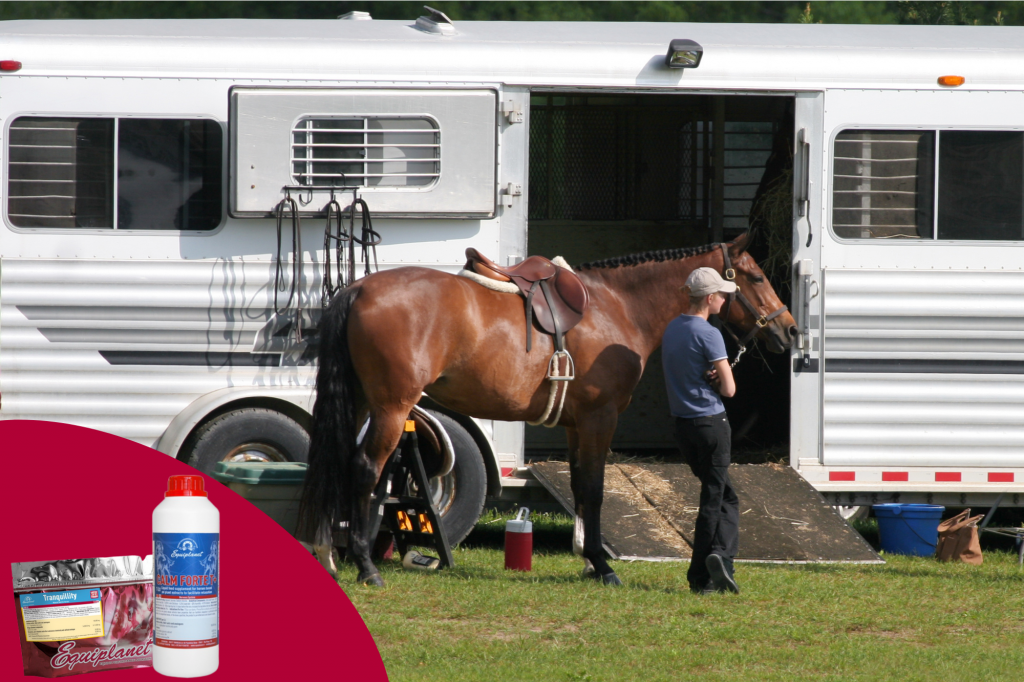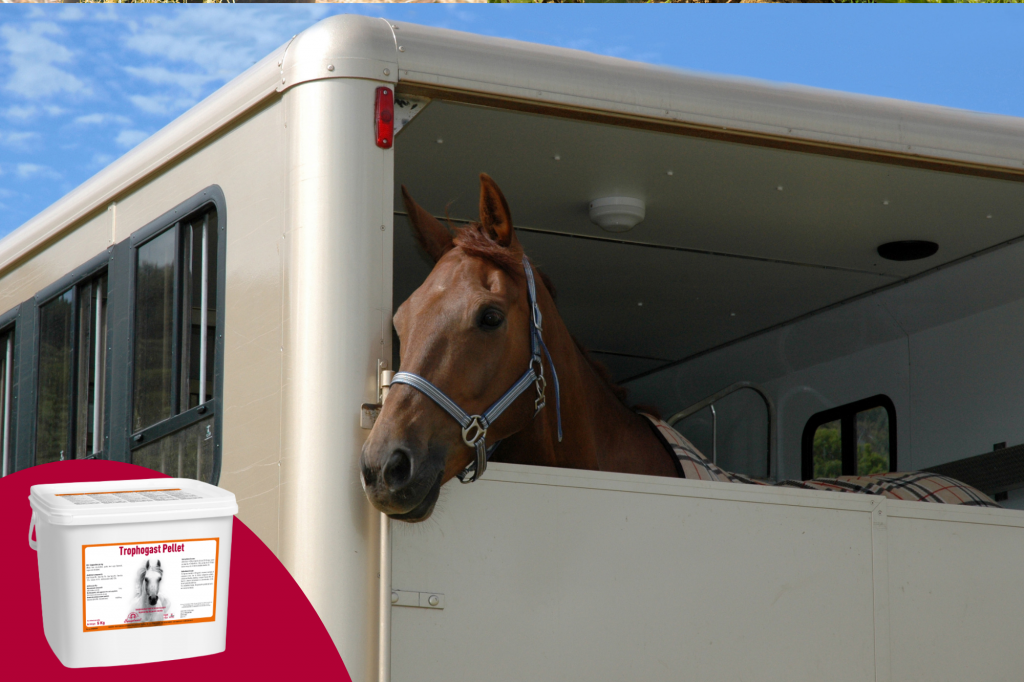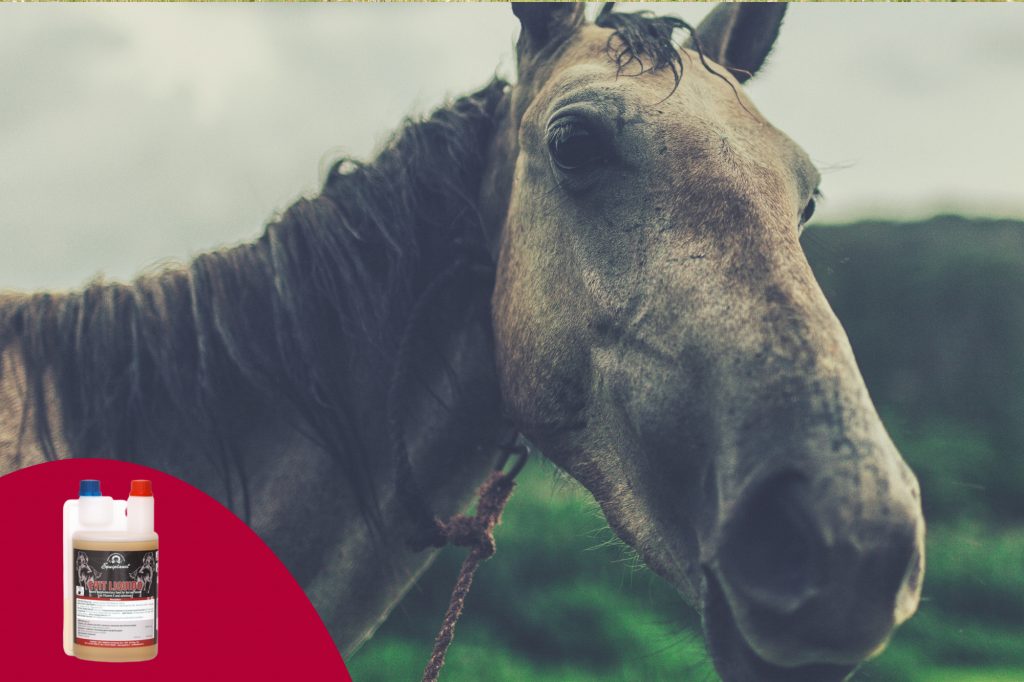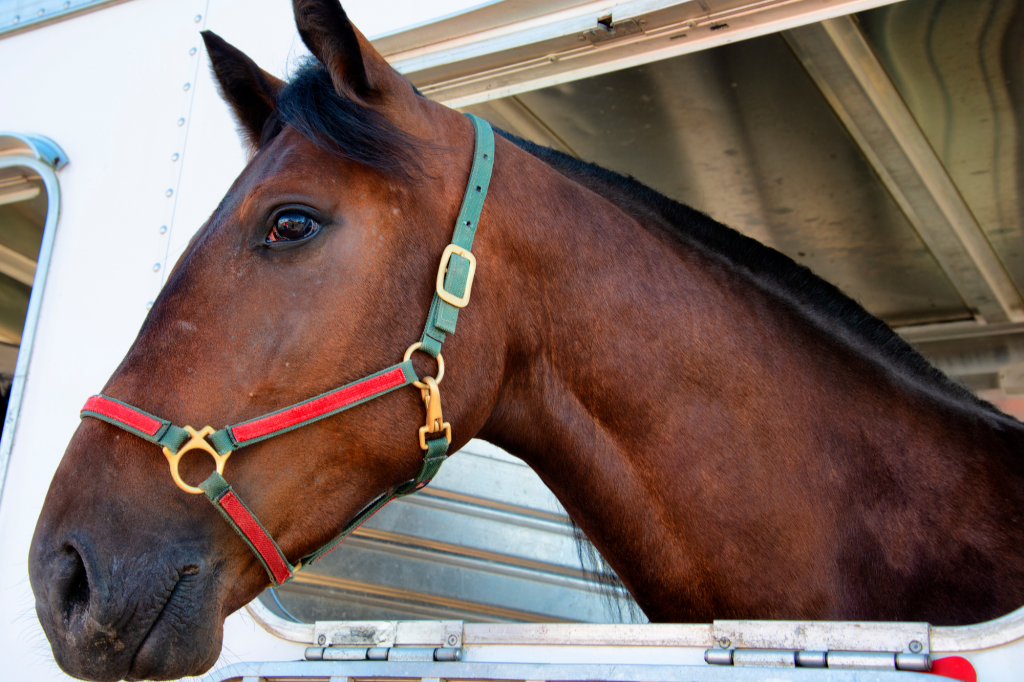
Horse management in summer in 10 steps
29 June 2022
Overweight horse
27 September 2022Transport stress in the horse

Transport stress in the horse has been amply demonstrated in the field and everyone easily understands the repercussions of a travel on equine welfare. What is meant by stress? We all know it but it is not easy to define. It has been described as a consequence of the negative effects of management or the environment that force an animal to change its natural condition or behaviour to avoid a physiological malfunction, thus helping the animal to cope with its environment.
- Transport stress and altered physiology in the horse
- Reducing stress before transport
- Transport stress in horses: short and long distances
- Transport stress and diet
- Grain diet or fibrous feed?
- Grain diet or fibrous feed?
- STransport stress and fasting
- Carriage stress in pregnant mares
- Transportation stress in elderly horses
- Head position and orientation during transport
- Transportation stress in the horse: water and electrolytes
- After arrival
- Recovery period after transport

Let’s see how this can be done to minimise transport stress in the horse:
Transport stress and altered physiology in the horse [ Back to menu ]
Transport involves several potential stress factors, including loading, unloading and housing in a new and unfamiliar environment and confinement with or without movement, vibrations, changes in temperature and humidity, inadequate ventilation and, often, deprivation of feed and water. Animals perceive specific characteristics of their environment and react to them with appropriate behavioural and emotional responses. The deleterious response to road transport is a major problem in equine practice.

It causes various physiological, immunological and metabolic changes that lead to an increased susceptibility to various disorders: respiratory, enteric and muscular. The transport of horses accustomed to travelling leads to increased cortisol release and changes in heart rate, which are indicative of stress. The degree of these changes tends to be more pronounced on the first day of transport both on the outward and return travel

The physiology of the respiratory system
The stress associated with road transport is believed to contribute significantly to post-transport respiratory problems in horses. Therefore, it is important to support the immune and respiratory systems through the use of complementary feeds such as Horse Immuno Fluid and Jodoresp.

The physiology of the muscular system
The muscular system also needs to be protected and preserved from the inevitable build-up of lactic acid due to the horse’s continuous support and movement to maintain standing and position within the van or trailer. There are several complementary feeds that can be given, such as Muscle racing a few days before departure or Lacta Aid or No Acid. For more details on these products and the horse’s musculature you can consult our previous in-depth discussion https://bit.ly/MuscolaturaDelCavallo

The physiology of the enteric system
Digestive disorders are common in horses after transport. Ideally, dietary changes should be made seven to ten days before departure to reduce the likelihood of digestive disorders by adding complementary feeds based on prebiotics and probiotics such as Enterovet to the ration.
Reducing stress before transport [ Back to menu ]

Many horses have been familiar with transport since foaling. Even many horses that have never been transported before often allow themselves to be loaded and confined in a van or trailer. A small minority of horses may be difficult to handle during transport and appropriate measures must be taken in these. In order not to interfere with temperature regulation, relaxation can be promoted through the use of complementary feeds that promote relaxation such as Tranquillity to be given over several days or Calm Forte T+, which is faster acting, in the order of a few hours.

Facilitating transport of the horse
- Choose a van or trailer that is suitable for the size and temperament of the horse, preferably one that allows the horse to lower its head.
- Remember to inspect the transport vehicle for cleanliness and hygiene
- Plan the route to minimise duration and temperature extremes and provide stops
- The floor must be non-slip throughout the travel
- Choose absorbent bedding
- Adequate ventilation of the transport vehicle
- Avoid prolonged stops in traffic
- Make hay and water available
Transport stress in horses: short and long distances [ Back to menu ]
Long distance transport is associated with stress-related changes in the immune function of equines and problems associated with transport are often reported. Horses are frequently transported in short distances, but the effects on immune function remain largely unknown.

A study conducted on 12 horses aged between 15 and 30 years wanted to test the efficacy of administering antioxidants for three weeks before and after short-distance transport (1.5-2 hours). It was found that short-term transport influenced physiological, endocrine and immune responses and that supplementation with antioxidants can certainly improve the response to transport stress in older horses. Immune responses were most altered 15 minutes after transport and generally recovered by day 1, suggesting that horses may be vulnerable to stress during and almost immediately after short-term transport.

Air transport? [ Back to menu ]
The length of stay in the aeroplane should be reduced as much as possible, as should the duration of stops on the ground, and auxiliary ventilation systems should be used to maintain optimum air quality. Generally, the worst air quality occurs during ground stops. Aeroplanes are ventilated when in flight, while relative humidity and temperature rise rapidly in a closed, stationary vehicle.
Transport stress and diet [ Back to menu ]
It give the impression that diet also influences transport stress in the run-up to a competition, and not in the least. A 2017 study analysed the effects of transport and diet on the metabolic response in trotter horses in training and divided into two groups: one fed a forage-only diet and one fed a 50:50 diet of forage and oats.

The conclusion was that both transport and diet influence the metabolic response during exercise in horses. Blood cortisol concentration is used as an indicator of stress, and was higher when horses were transported and lower in horses fed only fodder. The reason for this is unclear, but there are other studies from 2015 (Bulmer et al.) reporting the detrimental effects of a high-starch diet compared to a high-fibre diet.
Grain diet or fibrous feed? [ Back to menu ]

The damaging effects of starchy feeds affect reactivity, heart rate and behaviour, indicating that diet can influence the horse’s neurophysiology. Furthermore, cortisol increases the concentration of fatty acids by stimulating the breakdown of adipose tissue. Therefore, in sport horses under stress, it is important to feed fibrous feed, such as Fat Fiber, a feed high in fibre and fat, to provide higher digestible energy, which forage alone could not provide.
Weight loss during transport [ Back to menu ]
It is normal for a horse to lose weight during transport. The amount of weight lost can vary from 0.45 to 0.55% of the weight per hour of transport, so we are talking about 2.5 kg per hour in a 500 kg horse. This weight loss may reflect reduced food intake during the journey, dehydration, excretion of faeces and urine and sweating. Horses may lose 20 kg during international flights and horses with transport heat gain may lose 75 kg or more during travel. Horses travelling for more than 12 hours have been found to lose up to 5% of their body weight (25 kg in a 500 kg horse).
Transport stress and fasting [ Back to menu ]

During transport the horse may decrease its intake of hay that stimulates drinking and salivation. Transport stress reflects on fasting and the longer it is prolonged, the more it favours the onset of gastric disorders. In defence of the stomach mucosa, it is important to use complementary feed that supports normal gastric physiology such as Trophogast pellets, whose efficacy in healing moderate ulcers has been tested by the University of Milan. It is advisable to start administer it a few days before departure and to extend it until return to the stable
Carriage stress in pregnant mares [ Back to menu ]

Carriage stress affects all horses, including pregnant mares. Transportation induces an increase in cortisol release and was measured together with progesterone in a study involving 16 full-term pregnant mares. Transport lasted 3 hours for 12 mares and the other 4 remained in the stable as a control group. In fact, transport-induced maternal cortisol release anticipated the onset of foaling, but transport did not influence the duration of foaling or the time to first standing
Transportation stress in elderly horses [ Back to menu ]

Elderly horses are particularly at risk because they represent a large percentage of the horses routinely transported and with advancing age their immune efficiency declines. Therefore, physiological immune decline and transport stress may favour alterations in normal physiology, even with short journeys. A study conducted on 16 horses over 25 years of age showed that these alterations appear as early as 15 minutes after the start of transport and recovery in these subjects can take up to a month. Antioxidants are a valuable aid, complementary feeds containing vitamin E and selenium such as Evit Liquido can be introduced at least 3 weeks before the travel is scheduled.
Head position and orientation during transport [ Back to menu ]
Horses should have as much freedom of movement of the head as possible. Head-up posture for prolonged intervals can severely compromise lung clearance mechanisms and predispose a horse to heat rises. Hay nets should be placed as low as possible.

The orientation of the horse within the transport vehicle has been identified as a potential source of stress. Several studies have examined horses facing towards or against the direction of travel. With some variation, studies suggest that horses facing the direction of travel experience less stress and a better ability to clear the airway and regulate posture.
Transportation stress in the horse: water and electrolytes [ Back to menu ]
Unless the horse has a history of dehydration, excessive or uncontrolled administration of electrolytes may have negative effects on the horse’s water and electrolyte balance. Check that the horse to be transported has been drinking normally in the days preceding transport and especially immediately before transport. Electrolytes must be present in the ration on a regular basis, not just in preparation for transport.

The administration of oral or intravenous fluids prior to travel is generally not recommended, unless the horse has a history of dehydration during travel. The horse experiences transport stress more severely in summer and this may be reflected in the thirst reflex. A horse may lose a significant amount of sweat during the travel, potentially up to 18 litres in a 10-hour trip.
fter arrival: how to do to avoid stress transport in horse? [ Back to menu ]

Horses should be unloaded as soon as possible to avoid further confinement and other stress factors. They should drink voluntarily and be interested in eating within one or two hours of arrival. It is recommended that they be walked by hand or walked around in a small paddock for about an hour upon arrival after a long travel.
Recovery period after transport [ Back to menu ]
Despite all efforts to prevent transport stress or other physiological changes, some horses show problems during or in the first three days after transport. For road travel of 6-12 hours, one day’s rest is sufficient. When horses travel more than 12 hours by road or are transported by air, a recovery period of 2 or 3 days should be planned.
Still have doubts about transport management? Contact the Equiplanet team for the best way to manage your horses’ journeys from a nutritional point of view.
Bibliography
- Short-term transport stress and supplementation alter immune function in aged horses. A B Miller, 2021
- Road Transport of Late-Pregnant Mares Advances the Onset of Foaling. Nagel C, 2019
- Road transport and diet affect metabolic response to exercise in horses. M. Connysson, 2017
- Evaluation of stress during transport. E Fazio, 2003
- Transport induced inflammatory responses in horses. J Wessely-Szponder, 2015
- Changes in cortisol release and heart rate variability in sport horses during long-distance road transport. A Schmidt, 2010
- Effects of road transport on indices of stress in horses. B L Smith, 1996
- Stress responses of horses during a long period of transport in a commercial truck, T H Friend 1998
- Plasma total antioxidant status in horses after 8-hours of road transportation. Niedźwiedź A, 2013
- Dehydration, stress, and water consumption of horses during long-distance commercial transport. T H Friend, 2000

